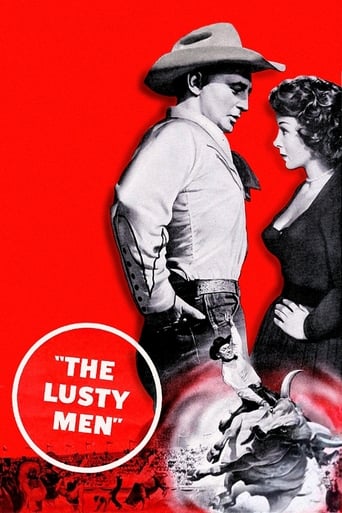marcslope
Yes, as one commenter noted, Susan Hayward seems a bit Eastern-glamorous to be kicking up dust on the rodeo circuit. But she glowers and snarls with the best of them, and, top-billed in this man's-man movie, she's great fun. But even she's dominated by a supremely confident and virile Robert Mitchum, as a has-been rodeo champ trying to turn her husband (a rather miscast, but hard-working, Arthur Kennedy) into a king of the saddle. It's location-filmed and has no traces of studio hackery, and Nicholas Ray keeps it wonderfully outdoorsy, with some fabulous stunt-riding footage and an authentic atmosphere of the hardscrabble rodeo life. The initial Hayward-Mitchum shower scene has to be one of the sexiest in all 1950s cinema, and there's a great sexual undercurrent to all their encounters. Kennedy seems a little pallid by comparison, and is playing a character that's hard to root for, but he does try hard. I didn't know this movie and am grateful to TCM for running it -- it's a real discovery. However, their print has awfully uneven sound, and you'll have to keep adjusting your volume up, down, up, down.
NewEnglandPat
This fine western about life on the rodeo circuit is more about drama than action but still packs a wallop, thanks largely to Robert Mitchum and Susan Hayward. Mitchum is a washed up bronc rider who becomes a mentor to Arthur Kennedy who has dreams of becoming a big time rodeo performer. Eager to buy a ranch but lacking money, Kennedy learns the ropes of rodeo performing and the three decide to travel the rodeo circuit although Hayward is cool to the idea. Under Mitchum's tutelage, Kennedy career takes off but he doesn't seem to notice the attraction between Mitchum and Hayward. Mitchum, rough and virile, looks the part of a cowboy and he and Hayward have great chemistry in their scenes but Kennedy is no cowboy and he doesn't seem to be a good match for Hayward. Arthur Hunnicutt does his usual good work in a key supporting role.
Kalaman
"The Lusty Men" is one of my all-time favorites and certainly one of Nicholas Ray's best. I love the strange and subtle relationship between Robert Mitchum's Jeff McCloud, Susan Hayward's Louise Merrit, and Arthur Kennedy's Wes Merrit. I love the audacity with which Ray puts it in everything: the painful and believable performances by three actors; the cinematography and the mis-en-scene have peculiar poetry and preciseness that often recalls John Ford's "Wagon Master"; the rodeo footages are daring and stunning.The ending is not that hokey or fake as one critic suggested, but a daring act of poetry and subtlety. In Ray's work, there is always a strong need to constitute the couple and the family; the emotional pull this creates is always extremely strong, and never merely "formal" (even in "Bigger Than Life"). That high-angle shot, after Jeff's death, the word "EXIT", indicating both that the couple (Wes and Louise) are leaving this world, and that the film is about to end. The compression here is characteristic of melodrama and of Ray. Jeff's return performance makes Wes realize that he'll never be as good in the rodeo as Jeff. So, the competitive motive that has been driving Wes has been removed. Second, Jeff's death relieves Wes of the need to die in the arena. It's a symbolic sacrifice, Jeff in place of Wes.
dbdumonteil
Nicholas Ray had always been fascinated by the relationship between two guys,the older one and the younger one.That was the story of "rebel without a cause" and "run for cover".Even in "Johnny Guitar",there 's a subplot displaying a relationship of the same kind between Johnny(and Emma) and Turkey.This is a cyclic movie ,beginning with a rodeo ,and ending the same way.A recurrent subject is the childhood nostalgia:Mitchum searching for his old rusty money-box in his parents house echoes Dean with his toy in the gutter in the opening scene of "rebel".Robert Mitchum , the stand-out of the film,portrays a cowboy down on his luck who meets another cowboy(Kennedy) and his wife (Hayward).He urges him to ride the rodeo,to make his dream come true:buying a ranch.The depiction of this cruel world is devoid of leniency:we're far away from that of ,say,"Bus stop".And in this man's man's man's world,Ray does not forget the women in the shadow,who hide their fears,suffer and cry.If they made a remake ,I'm sure their parts would be passed over in silence.Women in Ray movies are strong:Crawford in "Johnny Guitar" ,Gardner in "55 days at Peking" and even young girls like Wood in "Rebel" and O'Donnell in "they live by night".One can wonder whether this is an optimistic or a pessimistic ending.Most of Ray movies include death,but from this death,something new is born.Death is almost necessary to allow the others to go on.In "rebel',Wood and Dean reconcile with the adults who have understood Plato/Mineo's plight and near sacrifice;in" Johnny Guitar",monstrous Cambridge's shooting allows Crawford and Hayden to pick up the pieces;in "55 days at Peking",it's Gardner's sacrifice-while trying to help the children-who will lead Heston to adopt the little Chinese orphan girl.Here ,Mitchum did not die in vain: the young couple is now armed against life's harshness.



